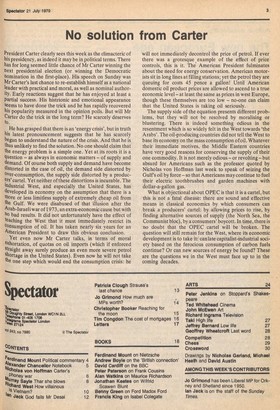No solution from Carter
President Carter clearly sees this week as the climacteric of his presidency, as indeed it may be in political terms. There has for long seemed little chance of Mr Carter winning the next presidential election (or winning the Democratic nomination in the first-place). His speech on Sunday was Mr Carter's last chance to re-establish himself as a national leader with practical and moral, as well as nominal authority. Early reactions suggest that he has enjoyed at least a Partial success. His histrionic and emotional appearance seems to have done the trick and he has rapidly recovered his popularity measured in the opinion polls. But will Mr Carter do the trick in the long term? He scarcely deserves to He has grasped that there is an 'energy crisis', but in truth his latest pronouncement suggests that he has scarcely begun to understand the nature of the crisis. And that he is thus unlikely to find the solution. No one should claim that the energy problem is a simple one. Yet at its roots it is a question — as always in economic matters — of supply and demand. Of course both supply and demand have become distorted in the case of oil, the demand side distorted by over-consumption, the supply side distorted by a producers' cartel. Yet neither of these distortions is incurable. The industrial West, and especially the United States, has developed its economy on the assumption that there is a More or less limitless supply of extremely cheap oil from the Gulf. We were disabused of that illusion after the Arab-Israeli war of 1973, an extra-economic cause but with Ito bad results. It did not unfortunately have the effect of teaching the West that it must immediately restrict its Consumption of oil. It has taken nearly six years for an American President to draw this obvious conclusion.
Yet even now Mr Carter talks, in terms of moral exhortation, of quotas on oil imports (which if enforced Straight away surely produce an even more severe petrol Shortage in the United States). Even now he will not take the one step which would end the consumption crisis: he will not immediately decontrol the price of petrol. If ever there was a grotesque example of the effect of price controls, this is it. The American President fulminates about the need for energy conservation. American motorists sit in long lines at filling stations; yet the petrol they are queuing for costs 45 pence a gallon! Until American domestic oil product prices are allowed to ascend to a true economic level — at least the same as prices in west Europe, though these themselves are too low — no-one can claim that the United States is taking oil seriously.
The supply side of the equation presents different problems, but they will not be resolved by moralising or blustering. There is indeed something odious in the resentment which is so widely felt in the West towards 'the Arabs'. The oil-producing countries did not tell the West to base its economy on the mass consumption °foil. Whatever their immediate motives, the Middle Eastern countries have very good reasons for conserving the supply of their one commodity. It is not merely odious — or revolting but absurd for Americans such as the professor quoted by Nicholas von Hoffman last week to speak of seizing the Gulf's oil by force — so that Americans may continue to fuel their electric toothbrushes and garden machines with dollar-a-gallon gas.
What is objectional about OPEC is that it is a cartel, but this is not a fatal disease: there are sound and effective means in classical economics by which consumers can break a producers' cartel: by allowing prices to rise, by finding alternative sources of supply (the North Sea, the Communist bloc), by a consumers' boycott. In time, there is no doubt that the OPEC cartel will be broken. The question will still remain for the West, where its economic development is to take it: can late capitalist-industrial society based on the ferocious consumption of carbon fuels continue? Or can new sources of energy be found? These are the questions we in the West must face up to in the coming 'decades.


































 Previous page
Previous page